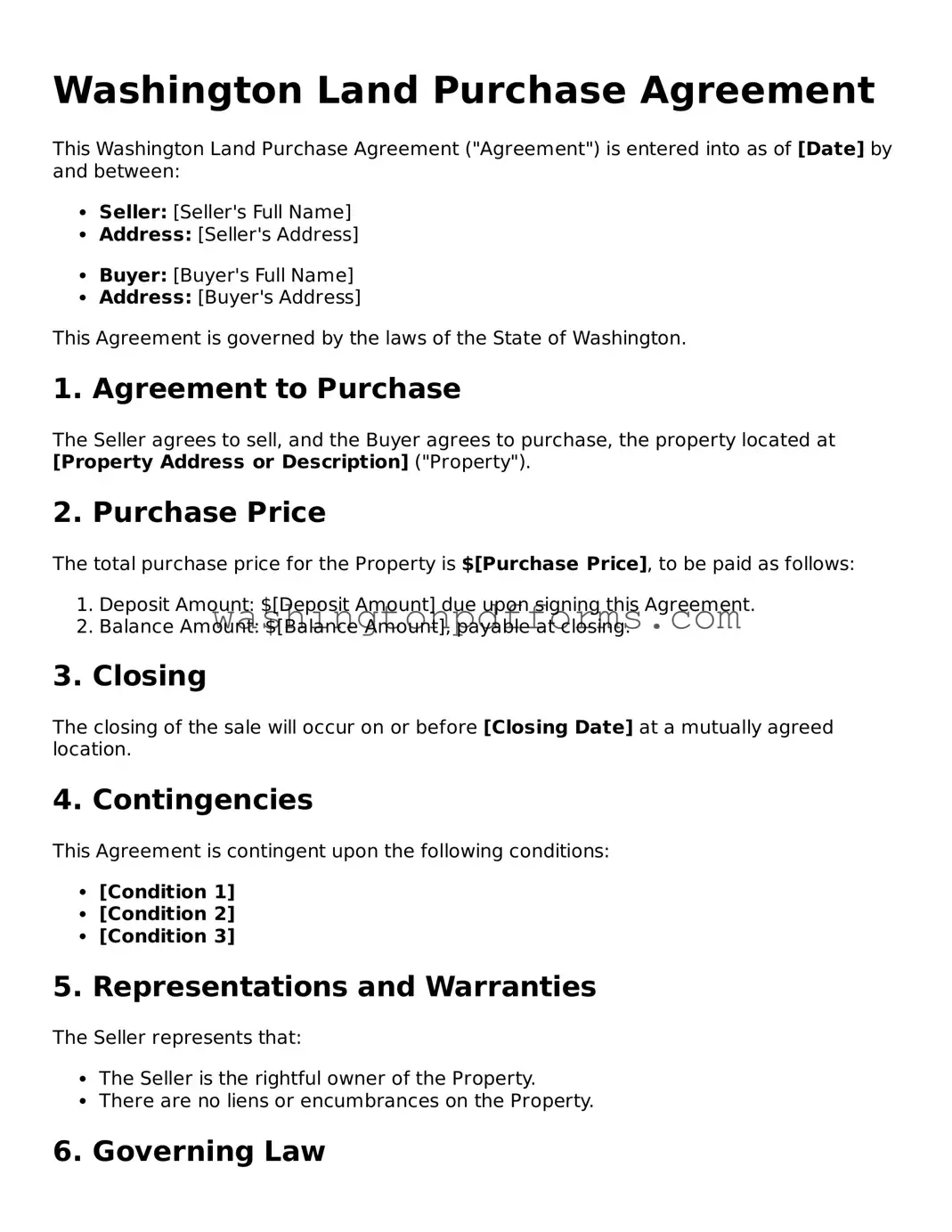Attorney-Approved Washington Land Purchase Agreement Template
When it comes to buying or selling land in Washington State, having a clear and comprehensive Land Purchase Agreement is essential. This form serves as a vital document that outlines the terms and conditions of the transaction, ensuring that both the buyer and seller are on the same page. Key aspects of the agreement typically include the purchase price, payment terms, and any contingencies that may affect the sale. Additionally, it addresses important details such as property descriptions, closing dates, and the responsibilities of each party throughout the process. Understanding these components not only helps to protect the interests of both parties but also facilitates a smoother transaction. With this agreement in hand, buyers can confidently move forward with their investment, while sellers can ensure their rights and expectations are clearly articulated and upheld.
Common mistakes
Filling out a Land Purchase Agreement form in Washington can be a straightforward process, but many people stumble along the way. One common mistake is not providing accurate property descriptions. The legal description must be precise, detailing boundaries and any relevant features. Failing to include this information can lead to disputes down the road.
Another frequent error involves the omission of essential parties. Buyers and sellers must both be clearly identified. If a party’s name is misspelled or left out entirely, it can complicate the transaction and create legal headaches. Ensuring that all parties are accurately represented is crucial for a smooth process.
Many individuals also overlook the importance of including all necessary terms and conditions. This includes payment details, contingencies, and any agreements regarding repairs or inspections. Without these terms, the agreement may lack clarity, leading to misunderstandings later on.
Inadequate signatures can derail the entire agreement. Each party must sign the document for it to be legally binding. Sometimes, people forget to sign or think that a verbal agreement suffices. A signature is not just a formality; it signifies consent and commitment to the terms outlined.
Another mistake is failing to understand the implications of contingencies. Buyers often include contingencies for financing or inspections, but they might not fully grasp how these conditions affect the agreement. If a buyer does not meet a contingency, it could result in the loss of their earnest money.
People sometimes neglect to seek legal advice before finalizing the agreement. While it may seem tempting to handle everything independently, the nuances of real estate law can be complex. Consulting with a legal professional can help prevent costly mistakes and ensure that the agreement complies with all local regulations.
Lastly, many overlook the importance of keeping copies of the signed agreement. Once the transaction is complete, having a record of the agreement is essential for future reference. Without a copy, individuals may find themselves in a difficult position if disputes arise regarding the terms of the sale.
Similar forms
- Real Estate Purchase Agreement: This document outlines the terms of a sale for residential or commercial property. Similar to a Land Purchase Agreement, it specifies the price, closing date, and contingencies.
- Lease Agreement: This contract establishes the terms under which one party agrees to rent property owned by another. Like a Land Purchase Agreement, it details the rights and responsibilities of both parties.
- Option to Purchase Agreement: This agreement gives a tenant the right to purchase the property at a later date. It shares similarities with a Land Purchase Agreement in that it sets out terms for a potential sale.
- Joint Venture Agreement: This document outlines the partnership between two or more parties in a real estate project. Similar to a Land Purchase Agreement, it defines the roles and contributions of each party involved.
- Deed: A deed transfers ownership of real property from one party to another. While it serves a different function than a Land Purchase Agreement, both documents are essential in the process of property transactions.
- Purchase and Sale Agreement: This document details the terms for buying and selling real estate. It is closely related to a Land Purchase Agreement, as both serve to formalize the sale process.
- Title Transfer Document: This document facilitates the transfer of property ownership. Like a Land Purchase Agreement, it is crucial for ensuring that ownership rights are clearly defined.
- Real Estate Disclosure Statement: This document provides information about the property's condition. It complements a Land Purchase Agreement by ensuring that buyers are informed of any issues before completing the purchase.
- BBB Complaint Form: This document is essential for consumers wishing to address grievances against businesses. It includes details required for filing a complaint, such as the business name, nature of the complaint, and desired resolution. For more information, refer to TopTemplates.info.
- Financing Agreement: This document outlines the terms of a loan used to purchase real estate. Similar to a Land Purchase Agreement, it specifies the financial obligations of the buyer.
- Closing Statement: This document summarizes the final financial transaction in a real estate deal. It is similar to a Land Purchase Agreement as it finalizes the terms agreed upon by both parties.
Some Other Washington Templates
Selling a Vehicle in Washington State - Helps in resolving any discrepancies concerning the sale after it occurs.
For those navigating complex situations, a well-prepared Cease and Desist Letter can be crucial in addressing disputes. You can find valuable resources to assist you by visiting the page dedicated to the Cease and Desist Letter form here: important Cease and Desist Letter guidelines.
Work Letter Template - A critical tool to ensure accurate information exchange.
